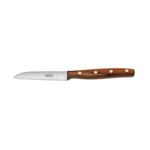Herder kitchen knife K1 HRC 60 blue pierced

Herder kitchen knife K1 HRC 60 blue pierced
- Extremely sharp: blade made of blue pierced carbon steel
- Sustained sharp thanks to material-typical self-sharpening effect
- Universal blade: for peeling, paring, etc.
General Information
Knife handles made of steamed, finely polished wood are rare. Knife handles made of steamed, finely polished apple tree wood are even rarer because apple tree wood, since it dries slowly, is not one of the typical commercial woods. However, it is very easy to work with due to its hardness, weight and durability. Herder in Solingen manufactures these knife handles with rarity value exclusively for Manufactum: even oiled for better surface protection.
Utility knife
The small universal blade, slightly flared towards the knife handle, is equally suitable for preparing, cleaning, paring and peeling.
Solingen thin grind: nail-thin and scrape-free
The Windmühlen knives from Robert Herder in Solingen are remarkable not only because of the knife steel (at least 0.75% carbon content and a hardness of at least 56 HRC for the carbon steels), but above all because of the craftsmanship, which spares none of the traditional grinding efforts: Windmühlen knives are ground extremely thin. This results in their astonishing cutting ability, which is an experience in use. The most elaborate type of sharpening is fuller grinding, a special type of thin grinding in which the blade is tapered towards the back of the knife.
Blaugepließtet
In Solingen, the process of smoothing the grinding grooves remaining on the blade is known as flattening, i.e. fine grinding. The most complex stage of this technique is blue polishing. The steel is ground finer step by step. You can tell that a blade is blue-fluted because it reflects slightly blue in the light.
Sharp for longer thanks to greater hardness
The elastic blades of the blue-blued knives from Herder are ground using the Solingen thin grind and fuller's edge. Thanks to the very high hardness of 60 Rockwell (HRC), they keep their sharpness significantly longer. However: Due to the high hardness - and precisely because they are ground so extremely thin - the blades should not be twisted or even tilted, as this can lead to chipping of the material when cutting.
Not stainless, but really sharp
The traditional material for knife blades is carbon steel. It is not rustproof, but with a fine-grained structure it can be hardened to a particularly high degree and made extremely sharp. The higher the carbon content, the higher the hardening capacity. These knives owe their high cutting ability to the material in addition to the finish, and their high cutting edge retention to a material-related self-sharpening effect. Each time a cut is made through fruit or vegetables, a minimal amount of material is removed and the blade wears evenly. The knifemaker refers to this as micro-corrosion. In fact, this means that the blade becomes steadily narrower over the years - but always retains its sharp grinding angle. Blades made of carbon steel acquire a dark patina over time, but this in no way negatively affects their quality; on the contrary, it gives them better protection against corrosion.
Care instructions:
Carbon steel knives do not belong in the dishwasher. Wipe the knives dry after rinsing and occasionally apply some blade oil. Discoloration may occur on the blade material. However, this is not a sign of inferior quality, but only indicates the rather high carbon content in the material. In case of flash rust, the use of the rust eraser is recommended. A resharpening can be done with the sharpening steel.
Product Information
Article Number 41249
- Extremely sharp: blade made of blue pierced carbon steel
- Sustained sharp thanks to material-typical self-sharpening effect
- Universal blade: for peeling, paring, etc.
Kitchen Knife (K1): Length of blade 9 cm, total length 20.5 cm. Weight 35 g.
The carbon steel blades are "blaugepließtet" (bluish finish grinding) and polished according to "Solinger Dünnschliff" (Solingen thin polish) tradition. With apple wood handles.
Care information:
Carbon steel knifes are not suitable for dishwasher use. Wipe the knife dry after washing (if it has not been used for a longer period of time, apply a little blade oil). For films of rust use of a rust eraser is recommended. Re-sharpen with a sharpening steel.
Note:
Because of their high degree of hardness, the blades should never be twisted or turned. Under certain circumstances this can lead to ruptures in the material.
Have a question?
If you have a question concerning this product you are welcome to contact us. For this your E-Mail program will open.
Contact Us
For advice, spare parts or special requests - our customer service will take care of your questions and concerns, personally and competently.
You can reach us from Monday to Friday at +49 2309 939095 or anytime at info@manufactum.com
Exclusive at Manufactum
Several particularly noteworthy products from selected manufacturers are available from us in a distinct form. In any case, these special editions offer you a maximum of quality in material and functionality.
Find exclusive products


